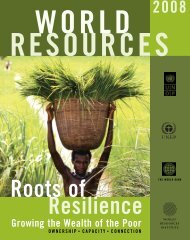jp8589 WRI.qxd - World Resources Institute
jp8589 WRI.qxd - World Resources Institute
jp8589 WRI.qxd - World Resources Institute
Create successful ePaper yourself
Turn your PDF publications into a flip-book with our unique Google optimized e-Paper software.
BOX 4.5 GLOBALIZATION, GOVERNANCE,<br />
AND POVERTY<br />
THE CURRENT WAVE OF ECONOMIC GLOBALIZATION<br />
has lifted many people out of poverty and enhanced human welfare.<br />
But the benefits of globalization have not yet reached far enough: over<br />
three billion people still live impoverished lives, and the fields, fisheries,<br />
forests, and waterways they depend on are increasingly at risk.<br />
As the Millennium Ecosystem Assessment points out, the transformation<br />
of ecosystems over the past five decades dwarfs the<br />
cumulative impact over the preceding centuries. This degradation<br />
is undercutting rural livelihoods (MA 2005:2). Half of all jobs<br />
worldwide depend on agriculture, forestry, and fishing. Yet agricultural<br />
subsidies and other import restrictions in developed countries<br />
make it difficult for developing country farmers to compete on the<br />
world market (WTO 2003:10, 22).<br />
Improving this situation will require better and smarter globalization.<br />
Ultimately, a sophisticated market economy is the only<br />
mechanism capable of generating lasting prosperity. Market-based<br />
approaches, where informed by socially and environmentally<br />
responsible public policy, have also been effective in forging<br />
solutions to some environmental problems. Emissions trading has<br />
been successful in reducing sulfur dioxide and nitrogen oxides, and<br />
tradable fishing quotas have reduced over-fishing (Aulisi et al.<br />
2005:11; Kura et al. 2004:92; Ellerman et al. 2000:315; NRC<br />
1999:192). Innovative approaches are being used to assign value,<br />
and hence to protect, “ecosystem services”—from crops and<br />
fisheries to water filtration and flood prevention. All of these need<br />
to happen in ways that rural people can participate in and benefit<br />
from—which will only happen if they have a degree of control over<br />
the process and the ecosystem “assets.”<br />
The public equity markets steer billions of dollars every day to companies<br />
and projects around the world. While often inadvertent, this<br />
allocation of capital all too often hastens the loss of forests, fisheries,<br />
and watersheds, and underwrites the build-up of greenhouse gases in<br />
the atmosphere. To counter this trend, many private banks have<br />
committed to the “Equator Principles,” which incorporate social and<br />
environmental criteria in investment decision-making. Major corporations<br />
are investing in environmentally cleaner technology because<br />
they are convinced it will increase their profits and make them more<br />
internationally competitive. In the energy sector, the International<br />
Energy Agency estimates that US$16 trillion will be required for<br />
global infrastructure investment over the next twenty-five years (IEA<br />
2004:383). Redirecting this massive capital flow to clean energy and<br />
transport systems could reduce poverty, increase security, and stabilize<br />
greenhouse gas emissions.<br />
To be pro-poor, investors and borrowers need to incorporate environmental<br />
sustainability in their activities. The developers of power, oil,<br />
gas, and mining projects will need to do a better job of managing<br />
risks to human health, as well as damage to rivers, fisheries, and<br />
other ecosystems. Borrowers from the Equator banks may have to<br />
drop or change their plans to meet environmental standards, as was<br />
done in many of ABN AMRO’s projects last year. However, while<br />
steering private investment in pro-poor directions is critical, it cannot<br />
achieve the desired outcome where bad governance is pervasive.<br />
Private investment in hydrocarbons and other extractive industries<br />
has sometimes been associated with corruption, environmental<br />
degradation, social dislocation, and impoverishment. Changing this<br />
will require more transparency, public participation, and accountability.<br />
The Extractive Industries Transparency Initiative (EITI),<br />
launched by the British government, is already proving successful.<br />
Royal Dutch Shell and BP have agreed to disclose detailed payment<br />
information on their oil operations in Nigeria and Azerbaijan, respectively.<br />
Investors representing over US$7 trillion have endorsed EITI,<br />
and civil-society organizations are using EITI as an instrument for<br />
government accountability. Endorsement of EITI by G-8 nations and<br />
oil-producing countries would make a decisive difference to the lives<br />
of the poor who live in the 60 countries that depend on oil, gas, and<br />
mining revenues (Soros 2005:43).<br />
Economic globalization has led to a host of technologies that can<br />
aid efficient market functioning, promote sound governance of<br />
natural resources, and protect the interests of the poor. Low-cost<br />
environmental data collection using remote sensing and highresolution<br />
satellite mapping is one example. Tracking and<br />
monitoring devices are helping to reduce over-exploitation of<br />
fisheries. In Malaysia conservationists use satellite transmitters to<br />
keep count of elephants (WWF 2005). Rural Indian farmers with<br />
high-speed Internet receive online updates about market prices<br />
and weather, making them more competitive (Annamalai and Rao<br />
2003:1). Increasingly low-cost and accessible technologies are<br />
beginning to measure trends in deforestation, soil erosion, and<br />
climate change. India, China, and Brazil have launched their own<br />
satellites, and are sharing data with other developing countries.<br />
Hopefully, it will not be long before existing databases—including<br />
poverty maps and maps of ecosystem services—can be overlaid<br />
routinely on the sites of proposed mining operations, timber<br />
harvests, or industrial plants to identify how these developments<br />
might affect poor families in the region.<br />
A smarter approach to economic globalization can work when the poor<br />
are empowered through access to information, participation, and<br />
justice, and when they have legally recognized resource rights that<br />
allow them to manage, sell, rent, and invest in ecosystem services. By<br />
partnering with the private sector to make credit available for ecosystem-based<br />
enterprises, and by improving the marketing and transport<br />
of goods produced, the poor can gain income and benefit from the<br />
wider marketplace that globalization affords. <br />
111

















